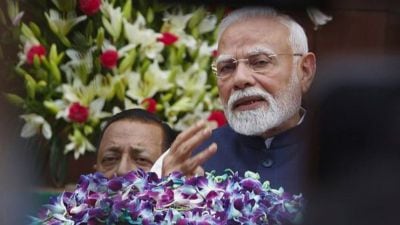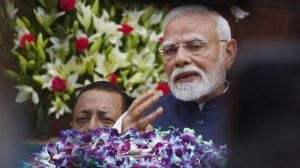Chandigarh goes to the dogs: Municipal Corporation registers around 100 bite cases a day
If the administration and MC start paying Rs 10,000 per bite mark as stipulated by the Punjab and Haryana High Court, they would have to pay Rs 10 lakh a day. What is worse, instead of taking habitual biters to the dog pound, the administration releases them at the same spot
 The two anti-rabies clinics in Sector 18 and Sector 38 report around 80 cases daily. This figure does not include those visiting the Sector 16 government hospital or private clinics. (File photo)
The two anti-rabies clinics in Sector 18 and Sector 38 report around 80 cases daily. This figure does not include those visiting the Sector 16 government hospital or private clinics. (File photo)Ajay Raj Singh & Shreya Suman
Dog bite incidents across the city are not just a public health concern but also a deeply personal trauma for those affected. The two anti-rabies clinics in Sector 18 and Sector 38 report around 80 cases daily. This figure does not include those visiting the Sector 16 government hospital or private clinics. Victims are left grappling with physical pain, emotional distress, and mounting medical expenses.
Despite the Chandigarh Municipal Corporation’s compensation policy, stipulated by the Punjab and Haryana High Court, which offers financial relief of Rs10,000 per bite mark, most victims remain unaware of the scheme, leaving them to face the aftermath alone.
This lack of awareness works in favour of the Municipal Corporation, which has allocated a modest Rs 10 lakh budget for dog bite cases. Otherwise, they would be liable to pay a minimum of Rs10 lakh daily, assuming every victim claimed compensation for just one bite mark.
Unprovoked attacks
Priya Sharma, 26, a resident of Sector 22, recalls her ordeal from October. “The dog seemed harmless until it suddenly bit my ankle. Despite cleaning the wound immediately, it got infected, and the pain was unbearable for days. Every clinic visit brought back the trauma,” she said. Priya endured weeks of treatment, unaware that under the government’s compensation scheme, she could have claimed at least Rs 20,000 for her injuries.
Ramesh Verma, 45, from Sector 15, had a similar experience in September. “I was walking past a group of stray dogs when one of them lunged at me and bit my calf. At first, I didn’t feel the pain; I just froze when I saw the blood. The fear of rabies hit me instantly,” he said. Hours spent waiting at a clinic only added to his anxiety. Like Priya, Ramesh was eligible for financial aid under the government’s policy but remained unaware of it.
Megha Joshi, 31, from Sector 34, had always been fond of animals until she was bitten in April while feeding a pack of stray dogs outside her building. “The bite was so sudden, and the pain so sharp, I started shaking uncontrollably. I couldn’t find a clinic with anti-rabies shots nearby, and the panic of not knowing if the dog was vaccinated made it even worse,” she said.
Traumatised, Megha has since distanced herself from the animals she once cared for deeply.
Serial biter on the loose in Sector 27 A
Dr Reena Singh, a resident of Sector 27A, Chandigarh, was attacked by two stray dogs near her home on May 11, 2024. “The bites were severe and left me in immense pain and fear,” she said.
The dog that bit her continues to be on the prowl and has since bitten two more people, the most recent case being of an NRI who was bitten without any provocation on December 10. The dog is foaming at the mouth and locals are hoping the MC dog catchers will take it to a pound. Earlier in the year, they took it away and gave it one vaccination but it went missing when they tried to trace it for the second dose.
Despite filing a police report and undergoing rabies treatment at a government hospital, Singh has yet to receive any compensation. “There is no clear procedure for victims like me to seek compensation. My efforts to find assistance have gone unanswered,” she stated.
Singh has called on the Chandigarh Administration to prioritise citizen safety, implement a compensation process, and take action against the stray dog menace. “The lack of action leaves residents vulnerable to such attacks,” she added.
The trauma
Arjun Gupta, 33, from Sector 34, had an equally harrowing experience in July. “I was walking home late at night when I noticed a pack of stray dogs following me. Before I knew it, one of them bit my calf, and the rest started chasing me. The physical pain was nothing compared to the terror of that moment and later he was forced to see a private clinic and charged Rs 500 per shot of anti-rabies vaccine,” he said. Months later, he still avoids walking alone at night, gripped by fear of another attack. Like others, Arjun never knew he could have received compensation to help cover his medical expenses.
 7 steps to manage a dog bite
7 steps to manage a dog bite
Brij Bala, 63, who’s retired from the Chandigarh Police, has stopped going for a stroll outside her home ever since she was attacked from behind by a pack of stray dogs while coming back from a swim in the Sector 22 swimming pool in May this year. Her son, Ankit Aggarwal, said the attack was totally unprovoked. “Imagine the plight of my mother who was alone at that time. I rushed her to the Sector 23 dispensary only to be told that I should go to Sector 38 anti-rabies clinic. I still shudder when I think of that day.”
Ankit lamented that the dogs had made a pack of sorts near the Sector 23 government houses where some people were feeding them. “By all means feed these dogs but then also make sure you get them vaccinated and keep them at your place.”
HC stipulates compensation
The UT Administration’s policy offers compensation of up to Rs 2 lakh for dog bite victims, with Rs 10,000 awarded per tooth mark and Rs 20,000 for every 0.2 cm of torn flesh. However, health care professionals highlight that the policy’s benefits are often underutilised due to a lack of awareness.
As per the Punjab and Haryana High Court ruling passed on August 18, 2023, compensation has to be given within four months.
A public health expert stressed the importance of spreading information about the scheme. “We see numerous cases daily where victims not only suffer physical injuries but are also weighed down by the financial and psychological burden of their experience. Many don’t even know about the compensation they’re entitled to, which could significantly ease their recovery process,” she said.
Healthcare professionals also warn of the dangers of delayed treatment, especially among economically weaker sections. “Rabies is almost always fatal once symptoms appear. Immediate medical attention is critical, yet many victims approach us days after being bitten, increasing the risk of complications,” said a general practitioner in Sector 38.
Experts believe the issue demands a multi-faceted approach involving public education, humane management of stray dogs, and improved access to healthcare. “Sterilisation and vaccination programmes for stray dogs are essential to control aggression and reduce the risk of bites,” said a veterinarian. He also emphasised the importance of public education campaigns to teach people how to interact with stray dogs and what to do if bitten.












